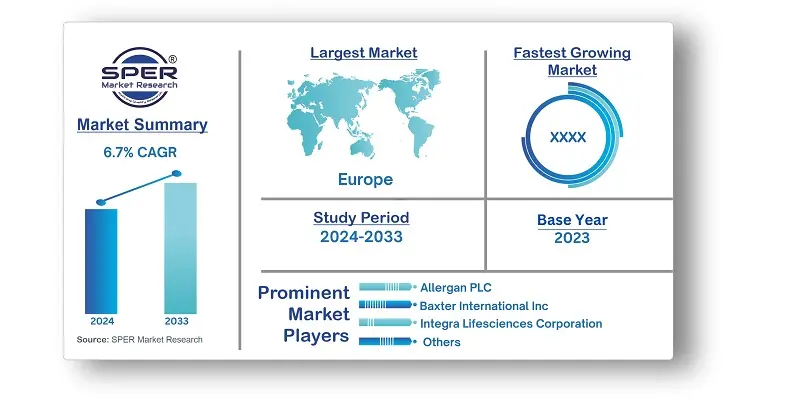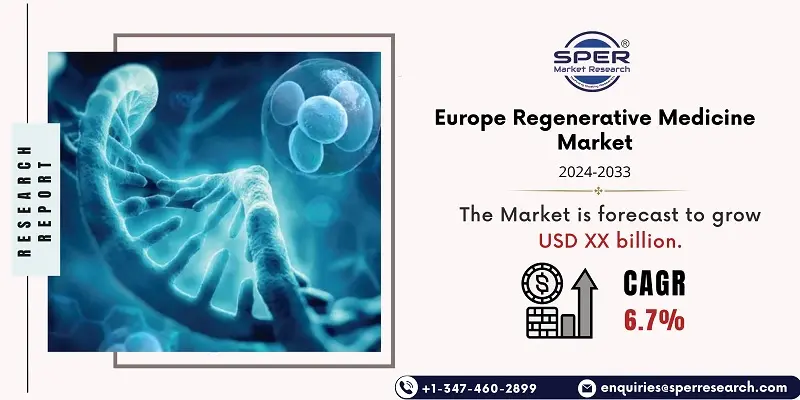
Europe Regenerative Medicine Market Growth, Size, Trends, Share, Revenue and Future Outlook
Europe Regenerative Medicine Market Size- By Type of Technology, By Application- Regional Outlook, Competitive Strategies and Segment Forecast to 2033
| Published: Apr-2024 | Report ID: HLCA2440 | Pages: 1 - 152 | Formats*: |
| Category : Healthcare | |||
- September 2022: Kite reported that Tecartus (brexucabtagene autoleucel), a CAR T-cell therapy, has been approved by the European Commission (EC) for the treatment of adult patients with relapsed or refractory (r/r) B-cell precursor acute lymphoblastic leukaemia (ALL) who are 26 years of age and older.
- August 2022: Charles River obtained authorization from the European Medicines Agency (EMA) to manufacture and sell allogeneic cell therapy products for distribution throughout Europe.


| Report Metric | Details |
| Market size available for years | 2020-2033 |
| Base year considered | 2023 |
| Forecast period | 2024-2033 |
| Segments covered | By Type of Technology, By Application |
| Regions covered | Belgium, France, Germany, Italy, Netherlands, Russia, Spain, Switzerland, The U.K., Turkey, Rest of Europe |
| Companies Covered | Allergan PLC, Baxter International Inc., Becton Dickinson and Company, Cook Biotech Incorporated, Integra Lifesciences Corporation, Medtronic PLC, Merck KGaA, NuVasive Inc, Organogenesis Inc., Smith & Nephew (Osiris Therapeutics), Thermo Fisher Scientific, Vericel Corporation, Others |
- Healthcare Providers and Hospitals
- Pharmaceutical and Biotechnology Companies
- Research Institutions and Academia
- Patients and Patient Advocacy Groups
- Medical Device Manufacturers
- Clinical Research Organizations (CROs)
- Healthcare Insurance Providers
- Others
| By Type of Technology: |
|
| By Application: |
|
- Europe Regenerative Medicine Market Size (FY’2024-FY’2033)
- Overview of Europe Regenerative Medicine Market
- Segmentation of Europe Regenerative Medicine Market By Type of Technology (Biomaterial, Stem Cell Therapy, Tissue Engineering, Other Types of Technologies)
- Segmentation of Europe Regenerative Medicine Market By Application (Bone Graft Substitutes, Cardiovascular, Central Nervous System, Dermatology, Osteoarticular Diseases, Other Applications)
- Statistical Snap of Europe Regenerative Medicine Market
- Expansion Analysis of Europe Regenerative Medicine Market
- Problems and Obstacles in Europe Regenerative Medicine Market
- Competitive Landscape in the Europe Regenerative Medicine Market
- Impact of COVID-19 and Demonetization on Europe Regenerative Medicine Market
- Details on Current Investment in Europe Regenerative Medicine Market
- Competitive Analysis of Europe Regenerative Medicine Market
- Prominent Players in the Europe Regenerative Medicine Market
- SWOT Analysis of Europe Regenerative Medicine Market
- Europe Regenerative Medicine Market Future Outlook and Projections (FY’2024-FY’2033)
- Recommendations from Analyst
1.1. Scope of the report1.2. Market segment analysis
2.1. Research data source2.1.1. Secondary Data2.1.2. Primary Data2.1.3. SPER’s internal database2.1.4. Premium insight from KOL’s2.2. Market size estimation2.2.1. Top-down and Bottom-up approach2.3. Data triangulation
4.1. Driver, Restraint, Opportunity and Challenges analysis4.1.1. Drivers4.1.2. Restraints4.1.3. Opportunities4.1.4. Challenges4.2. COVID-19 Impacts of the Europe Regenerative Medicine Market
5.1. SWOT Analysis5.1.1. Strengths5.1.2. Weaknesses5.1.3. Opportunities5.1.4. Threats
5.2. PESTEL Analysis
5.2.1. Political Landscape5.2.2. Economic Landscape5.2.3. Social Landscape5.2.4. Technological Landscape5.2.5. Environmental Landscape5.2.6. Legal Landscape5.3. PORTER’s Five Forces5.3.1. Bargaining power of suppliers5.3.2. Bargaining power of buyers5.3.3. Threat of Substitute5.3.4. Threat of new entrant5.3.5. Competitive rivalry5.4. Heat Map Analysis
6.1. Europe Regenerative Medicine Market Manufacturing Base Distribution, Sales Area, Product Type6.2. Mergers & Acquisitions, Partnerships, Product Launch, and Collaboration in Europe Regenerative Medicine Market
7.1. Europe Regenerative Medicine Market Size, Share and Forecast, Share By Type of Technology (2020-2026)7.2. Europe Regenerative Medicine Market Size, Share and Forecast, Share By Type of Technology (2027-2033)7.3. Biomaterial7.4. Stem Cell Therapy7.5. Tissue Engineering7.6. Other Types of Technologies
8.1. Europe Regenerative Medicine Market Size, Share and Forecast, By Application (2020-2026)8.2. Europe Regenerative Medicine Market Size, Share and Forecast, By Application (2027-2033)8.3. Bone Graft Substitutes8.4. Cardiovascular8.5. Central Nervous System8.6. Dermatology8.7. Osteoarticular Diseases8.8. Other Applications
9.1. Europe Regenerative Medicine Market Size and Market Share
10.1. Europe Regenerative Medicine Market Size and Market Share By Region (2020-2026)10.2. Europe Regenerative Medicine Market Size and Market Share By Region (2027-2033)10.3. Belgium10.4. France10.5. Germany10.6. Italy10.7. Netherlands10.8. Russia10.9. Spain10.10. Switzerland10.11. Turkey10.12. U.K.10.13. Rest of Europe in Europe
11.1. Allergan PLC11.1.1. Company details11.1.2. Financial outlook11.1.3. Product summary11.1.4. Recent developments11.2. Baxter International Inc11.2.1. Company details11.2.2. Financial outlook11.2.3. Product summary11.2.4. Recent developments11.3. Becton Dickinson and Company11.3.1. Company details11.3.2. Financial outlook11.3.3. Product summary11.3.4. Recent developments11.4. Cook Biotech Incorporated11.4.1. Company details11.4.2. Financial outlook11.4.3. Product summary11.4.4. Recent developments11.5. Integra Lifesciences Corporation11.5.1. Company details11.5.2. Financial outlook11.5.3. Product summary11.5.4. Recent developments11.6. Medtronic PLC11.6.1. Company details11.6.2. Financial outlook11.6.3. Product summary11.6.4. Recent developments11.7. Merck KGaA11.7.1. Company details11.7.2. Financial outlook11.7.3. Product summary11.7.4. Recent developments11.8. NuVasive Inc11.8.1. Company details11.8.2. Financial outlook11.8.3. Product summary11.8.4. Recent developments11.9. Organogenesis Inc11.9.1. Company details11.9.2. Financial outlook11.9.3. Product summary11.9.4. Recent developments11.10. Smith & Nephew (Osiris Therapeutics)11.10.1. Company details11.10.2. Financial outlook11.10.3. Product summary11.10.4. Recent developments11.11. Thermo Fisher Scientific11.11.1. Company details11.11.2. Financial outlook11.11.3. Product summary11.11.4. Recent developments11.12. Vericel Corporation11.12.1. Company details11.12.2. Financial outlook11.12.3. Product summary11.12.4. Recent developments11.13. Others
SPER Market Research’s methodology uses great emphasis on primary research to ensure that the market intelligence insights are up to date, reliable and accurate. Primary interviews are done with players involved in each phase of a supply chain to analyze the market forecasting. The secondary research method is used to help you fully understand how the future markets and the spending patterns look likes.
The report is based on in-depth qualitative and quantitative analysis of the Product Market. The quantitative analysis involves the application of various projection and sampling techniques. The qualitative analysis involves primary interviews, surveys, and vendor briefings. The data gathered as a result of these processes are validated through experts opinion. Our research methodology entails an ideal mixture of primary and secondary initiatives.



Frequently Asked Questions About This Report
PLACE AN ORDER
Year End Discount
Sample Report
Pre-Purchase Inquiry
NEED CUSTOMIZATION?
Request CustomizationCALL OR EMAIL US
100% Secure Payment






Related Reports
Our Global Clients
Our data-driven insights have influenced the strategy of 200+ reputed companies across the globe.




















